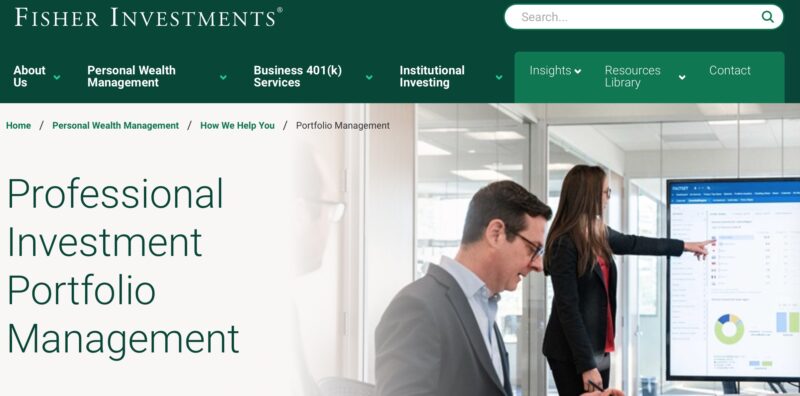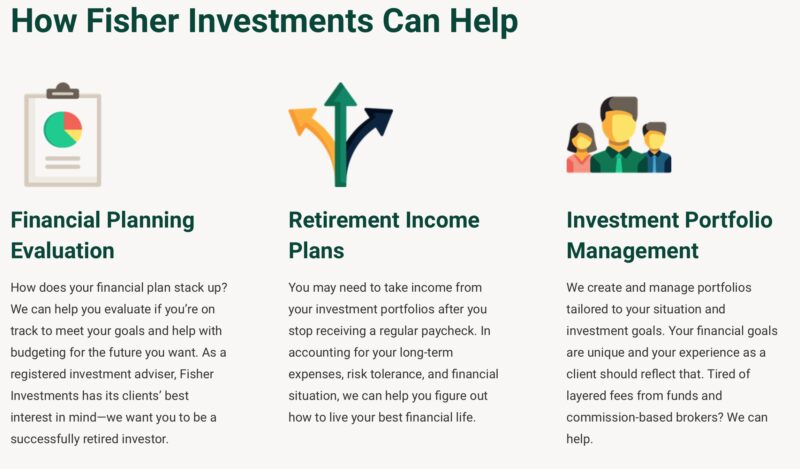Founded in 1979, Fisher Investments is a well-known investment advisory firm. But many investors are unaware of the services it offers and whether its money managers can improve their current portfolio performance.
Good wealth managers can provide the hands-on support that high-net-worth households need to manage their investments properly. They can also help investors who want personalized investment strategies.
In this Fisher Investments Review, I’ll cover everything from services and fees to account minimums and wealth management options.
Table of Contents
- What Is Fisher Investments?
- About Ken Fisher
- Investment Philosophy
- Historical Performance
- Fisher Investments Fees and Minimums
- Fisher Investments Services
- Pros and Cons
- Alternatives to Fisher Investments
- Who Is Fisher Best Suited For?
- Who Should Avoid Fisher Investments?
- The Bottom Line on Fisher Investments
What Is Fisher Investments?

Fisher Investments is an independent, fee-only registered investment advisory firm offering virtual and in-person private wealth and business 401(k) services.
The company was founded in 1979 by Ken Fisher. The firm’s headquarters are in Camas, WA, but are moving to Plano, TX, in the summer of 2023.
There are regional offices and investment representatives in several states across the U.S. In addition, Fisher has several international offices around the world. In total, Fisher Investments has more than 130,000 clients and $192 billion in assets under management (AUM).
Approximately $36 billion of the $192 billion under management is from institutional investors ($33 billion AUM) and U.S. small to mid-sized businesses ($3 billion AUM). The remaining client base is made up of individual investors.
The minimum investment threshold for most portfolios is $500,000, making Fisher’s service best-suited for high net worth investors. That said, you don’t need to be an accredited investor to join.
About Ken Fisher
Ken Fisher is the founder of Fisher Investments and is currently the company’s Executive Chairman and Co-Chief Investment Officer. He comes from a family of investment professionals. Before starting Fisher Investments, Ken was well-known for helping pioneer the Price-to-Sales ratio, one of today’s widely-used investment metrics.
Fisher also wrote one of the longest-running columns in Forbes Magazine, titled “Portfolio Strategy,” which ran monthly for 37.5 years through December 2016. He continues to make recurring national media appearances and write monthly investing columns.
Investment Philosophy
Unlike most wealth management services which take a passive investing approach with index funds, Fisher Investments practices active management and aims to outperform the market.
Most investment strategies are measured against the MSCI World Index, which tracks the performance of stocks in 23 developed international markets.
According to Fisher, the company’s philosophy is based on a “set of financial principles that guide all of our investment decisions, rooted in our belief in capitalism and the power of free markets.”
Fiduciary advisors help build tailored portfolios looking for domestic and global opportunities that fit clients’ personal goals and beliefs. Your portfolio may hold equities, bonds, ETFs, cash, and other securities that can produce long-term wealth.
Learn More About Fisher Investments
Historical Performance
Fisher Investments doesn’t publicly disclose its average portfolio performance, but you can inquire about a specific strategy by speaking with a regional representative.
The firm is transparent and states that its money managers don’t always get it right. Investment performance is calculated using the Global Investment Performance Standards (GIPS®), the industry standard for measuring the performance of investment managers.
Fisher Investments Fees and Minimums
Individuals and families must invest at least $500,000 to open a Private Client Group account. The annual management fee is reportedly between 1% and 1.5%, although individuals must schedule an appointment to review the fee structure.
However, Fisher Investments states, “We bill only on assets under management – we do not sell products or earn commissions on trades.”
Like most wealth management services, it has a tiered fee structure with smaller percentages for higher balance tiers.
Reports indicate that with account balances of $500,000 or less, pay a 1.5% fee. A multi-million-dollar portfolio is necessary to qualify for the 1% advisory fee. This fee structure is competitive with hiring a financial advisor but is more expensive than hybrid and robo-advisor platforms.
Fisher Investments Services
Fisher Investments is a discretionary money manager. That means that when you sign up, you give your portfolio manager the authority to make buy and sell decisions on your investments.
Of course, Fisher based these decisions on your overall investment objectives, which take into account your risk tolerance, time horizon, financial goals, etc. They meet with their clients regularly to revisit their objectives and make changes if necessary.
Portfolio Management

A fee-only advisor will help oversee your investment portfolio and personalize it to satisfy these factors:
- Personal goals
- Risk tolerance
- Time horizon
- Cash flow needs
- Capital gains tax optimization
Your investment counselor will also consider your outside income and assets to build a diversified portfolio and help you track each investment.
You can have discussions during the planning and implementation process. Your advisor and the investment team will strategically place trades. While you are assigned a primary counselor, a team of professionals will service and manage your portfolio.
Your investment options include the following:
- Equity accounts: Stocks, ETFs, and mutual funds
- Fixed income accounts: Bonds and income-producing assets
- Blended accounts: A combination of equities and fixed-income investments
Fisher supports both taxable brokerage and tax-advantaged retirement accounts. Your personalized investment plan will implement tax-optimization strategies to optimize your investment potential while minimizing the tax penalty.
As Fisher Investments doesn’t partner with a particular fund provider and adheres to the fiduciary rule, you won’t be steered towards a particular fund company.
Some of the allocations Fisher may incorporate include:
- Global
- Global excluding the United States
- United States strategies
- Emerging markets
- Long/Short equities
- Qualitative
Fisher Investments employs an in-house research team to provide top-down research into the various sectors. Your advisor will use these findings to help make informed, curated recommendations.
Financial Planning

Wealth management goes beyond picking the best investments for your short-term and long-term goals.
You can receive help with the following tasks:
- Budgeting
- Making an emergency fund
- Forming retirement goals
- Retirement expense withdrawal plan
- Estate planning (including donor-advised funds)
Working on these goals with your investment manager will help them analyze your entire financial picture. You’ll benefit from a reduced probability of outliving your wealth and a more precise personalized investment plan.
Learn More About Fisher Investments
Quarterly Portfolio Reviews
All members receive quarterly reviews from the Fisher Investments Investment Policy Committee. This report discusses the recent market performance, global investment conditions, and future market outlook.
Twice a year, the committee records a Capital Markets Update video that dives into more detail about how portfolio decision-makers currently interpret market conditions to adjust their investment philosophy.
Additionally, Founder Ken Fisher provides regular insights by column or video in addition to these quarterly reports.
Client Programs
One advantage of investing with Fisher is that you get access to interactive programs in 60 cities. With other services, you may have an annual portfolio review but rarely speak with your financial advisor during the rest of the year.
Some of Fisher’s resources include:
- Informal gatherings with other clients (no Fisher Investments staff are present)
- Investment roundtables
- Market forecast seminars
- Web-based seminars for asking questions to the Investment Policy Committee
There are no additional fees for these events.
Annuity Review
Fisher Investments doesn’t sell annuities but provides a complimentary consultation for clients who already have one. To gather information, an initial conference call will involve you, Fisher Investments, and the annuity plan insurance company.
After this initial discussion, your investment advisor will decide how Fisher Investments can potentially produce similar or better results. There is no obligation to convert your annuity if you believe it’s in your best interest to keep it.
Learn More About Fisher Investments
Pros and Cons
Pros
- Fiduciary advisors with fee-only pricing
- Financial planning access
- Construct tailored portfolios
Cons
- High minimum portfolio balance ($500,000)
- High annual management fees (1% to 1.5%)
- Not for passive investment strategies (i.e., index funds only)
Alternatives to Fisher Investments
Choosing a discretionary management firm to oversee a six or 7-figure investment portfolio is a big decision. Before you sign up with Fisher Investments, consider the following platforms. Note that none of these alternatives do exactly what Fisher does, as most are online platforms that encourage a more passive investing approach.
That’s not a bad thing – just remember to always compare apples to apples.
Empower
The Empower Personal Dashboard (previously Personal Capital) is perhaps the closest alternative, as they provide managed portfolios and access to a financial advisory team with as little as $100,000 in investable assets.
Empower also offers several free financial planning tools for all members, even if you don’t meet the $100,000 minimum or choose to manage your own portfolio. Some of the tools include a net worth tracker, investment fee and asset allocation analyzer, retirement planner, and a basic budget.
Additionally, an Empower Personal Cash account earns a competitive interest rate and offers up to $2 million in FDIC insurance. This cash management account offers unlimited withdrawals, and you can use it to pay bills. Read our Empower Investment review for more information.
Betterment
Betterment provides managed accounts with no minimum balance requirements. The robo-advisor invests in traditional stock and bond index ETFs for a low fee of 0.25% annually. You can also pursue customized strategies such as socially responsible funds, crypto, and target income. Tax-loss harvesting is free with all plans.
Getting on-demand financial advisor access with a minimum $100,000 account balance is possible as you qualify for the Premium plan. It won’t be at the same level as what Fisher Investments offers, but the annual fee is only 0.40% for all balance tiers.
Basic users also have access to several online retirement planning tools and financial calculators that can serve as an effective alternative to hiring an advisor.
The platform also offers a free checking account and high-yield cash management accounts that make it easier to avoid banking fees while enjoying many banking benefits. Learn more in our Betterment review.
Wealthfront
Wealthfront is a robo-advisor offering managed portfolios and automated financial planning tools. Unfortunately, it doesn’t offer access to a human advisor, which is a dealbreaker for some.
The minimum initial investment is $500; advanced portfolio options unlock with a higher balance. Two options include U.S. Direct Indexing ($100,000 minimum) and Smart Beta ($500,000 minimum). A 0.25% fee applies to all stock investing plans.
In addition to the low-cost investment options, the automated financial planning tools can help you develop a plan to save for pivotal life events, including college, retirement, and buying a home. You can try them first to decide if they provide the financial advice you seek.
The online brokerage offers banking products too. One feature is Wealthfront Cash Account with a competitive interest rate, unlimited transfers, no monthly fees, and up to $3 million in FDIC insurance (through partner banks).
A portfolio line of credit is also available when your assets can be more productive in other investment vehicles for a limited time. Read our Wealthfront review for all the details.
Who Is Fisher Best Suited For?
Fisher Investments is suitable for wealthy individuals who want access to financial planning services along with a fully managed investment portfolio. Professional management becomes more valuable when you have a substantial portfolio, and the fees can be worthwhile.
Individuals should consider services like what Fisher offers when they no longer want to manage their own portfolios. The ideal investor will prefer an active investing style that looks for more opportunities to build wealth but must be comfortable with an adaptive portfolio that’s more likely to exit positions and rebalance as market conditions change.
Who Should Avoid Fisher Investments?
This service isn’t for new investors and investors who wish to manage their own portfolios for a lower cost. You will pay fewer fees with a passive investment approach of buying and holding low-cost ETFs or index funds.
The $500,000 minimum will filter out small investors, and several robo-advisors offer basic portfolio management and financial planner access at a lower price.
Learn More About Fisher Investments
The Bottom Line on Fisher Investments
Fisher Investments is a good fit for high-net-worth investors who don’t need to be involved in the day-to-day decision-making and are willing to pay a slightly higher fee for professional advice and hands-on portfolio management.
The most significant hurdle is meeting the $500,000 investment minimum, and you must also be comfortable with an asset management fee as high as 1.5%. If you don’t meet the minimums or the fees are too high, robo-advisor platforms like the ones mentioned above may be a good compromise.
The post Fisher Investments Review: Hands-On Portfolio Management appeared first on Best Wallet Hacks.
from Best Wallet Hacks https://ift.tt/EZdbRh0
Comments
Post a Comment
We will appreciate it, if you leave a comment.